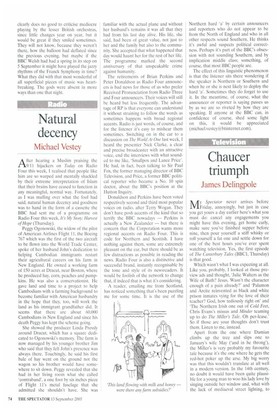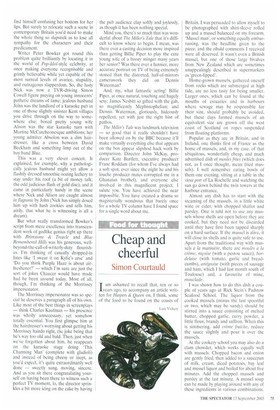Chaucer triumph
James Delingpole
My Spectator never arrives before Friday, annoyingly, but just in case you get yours a day earlier here's what you must do: cancel any engagements you might have this evening, get home early, make sure you've finished supper before nine, then pour yourself a stiff whisky or roll yourself a fat one and settle down for one of the best hours you've ever spent watching television. Yes, the first episode of The Canterbuly Tales (BBC1, Thursday) is that good.
Which wasn't what I was expecting at all. Like you, probably, I looked at those preview ads and thought, 'Julie Walters as the Wife of Bath? Jesus. Wasn't the character enough of a pain already?' and 'Palamon and Arcite reinvented as black and white prison inmates vying for the love of their teacher? God, how tediously right on' and 'The Northern Irish one out of Cold Feet, Chris Evans's missus and Minder teaming up to do The Miller's Tale. Oh per-lease.' So if those are your thoughts don't trust them. Listen to me, instead.
Apart from the one where Damian climbs up the tree and slips one to January's wife May ('and in he throng.), the Miller's is very probably my favourite tale because it's the one where he gets the red-hot poker up the arse. My big worry was that this wouldn't translate at all well in a modern version. In the 14th century, no doubt it would have been quite plausible for a young man to woo his lady love by singing outside her window and, what with the lack of mediaeval street lighting, to
find himself confusing her bottom for her lips. But surely to relocate such a scene in contemporary Britain you'd need to make the whole thing so slapstick as to lose all sympathy for the characters and their predicament.
Writer Peter Bowker got round this problem quite brilliantly by locating it in the world of Pop-Idol-style celebrity, at once making everyone recognisable and grimly believable while yet capable of the most surreal levels of avarice, stupidity, and outrageous slapperdom. So, the lusty Nick was now a TVR-driving Simon Cowell figure preying on young innocents' pathetic dreams of fame; jealous husband John was the landlord of a karaoke pub in one of those slightly sinister Kent villages you drive through on the way to somewhere else; bored pretty young wife Alison was the star karaoke turn with Martine MeCutcheonesque ambitions; her young admirer Absolon was a dim hairdresser, like a cross between David Beckham and something limp out of the boy band Blue.
This was a very clever conceit. It explained, for example, why a pathologically jealous husband might yet allow a flashily dressed smoothie oozing lechery to stay under his roof (a bit of money talk; the odd judicious flash of gold disc); and it came in particularly handy in the scene where Nick and Alison are caught almost in flagrante by John (Nick has simply dosed him up with hash cookies and tells him, airily, that what he is witnessing is all a dream).
But what really transformed Bowker's script from mere excellence into transcendent work of godlike genius right up there with Brimstone & Treacle and Blue Remembered Hills was his generous, wellbeyond-the-call-of-writerly-duty flourishes. Um thinking of casually dropped-in lines like 'I swear it on Kylie's arse' and `Do you think Purple Haze is about airfreshener?' — which I'm sure are just the sort of jokes Chaucer would have made had he been around today. Most of all. though, I'm thinking of the Morrissey impersonator.
The Morrissey impersonator was so special he deserves a paragraph all of his own. Like most of the best things in screenplays — think Charles Kaufman — his presence was wholly unnecessary, yet somehow totally essential. You first glimpse him at the hairdresser's worrying about getting his Morrissey hairdo right, the joke being that he's way too old and bald. Then, just when we've forgotten about him, he reappears on the karaoke stage doing 'This Charming Man' (complete with gladioli) and instead of being cheesy or inept, as you'd expect, it's quite extraordinarily well done — sweetly sung, moving, sincere. And as you sit there congratulating yourself on having been there to witness such a perfect TV moment, lo, the director sprinkles a bit more icing on the cake by having the pub audience clap softly and joylessly, as though it has been nothing special.
Mind you, there's so much that was wonderful about The Miller's Tale that it's difficult to know where to begin. I mean, was there ever a casting decision more inspired than getting Billie Piper to play the cute young wife of a boozy minger many years her senior? Was there ever a funnier, more accurate portrait on TV of being extremely stoned than the distorted, hall-of-mirrors camerawork they did on Dennis Waterman?
And, my, what fantastic acting! Billie Piper, at once natural, touching and hugely sexy; James Nesbitt so gifted with the gab, so magnificently Mephistophelian; and Dennis Waterman, gloriously, hideously repellent, yet with just the right hint of pathos.
The Miller's Tale was landmark television — so good that it really shouldn't have been allowed on by the BBC because it'll make virtually everything else that appears on the box appear slipshod hack work by comparison. Director John McKay, producer Kate Bartlett, executive producer Franc Roddam (for whom I've always had a soft spot, ever since the night he and his louche producer mates corrupted me in a Ghanaian brothel), and everyone else involved in this magnificent project. I salute you. You have achieved the near impossible. You have created a drama so magisterially wondrous that barely once for a whole TV column have I found space for a single word about me.



























































































 Previous page
Previous page